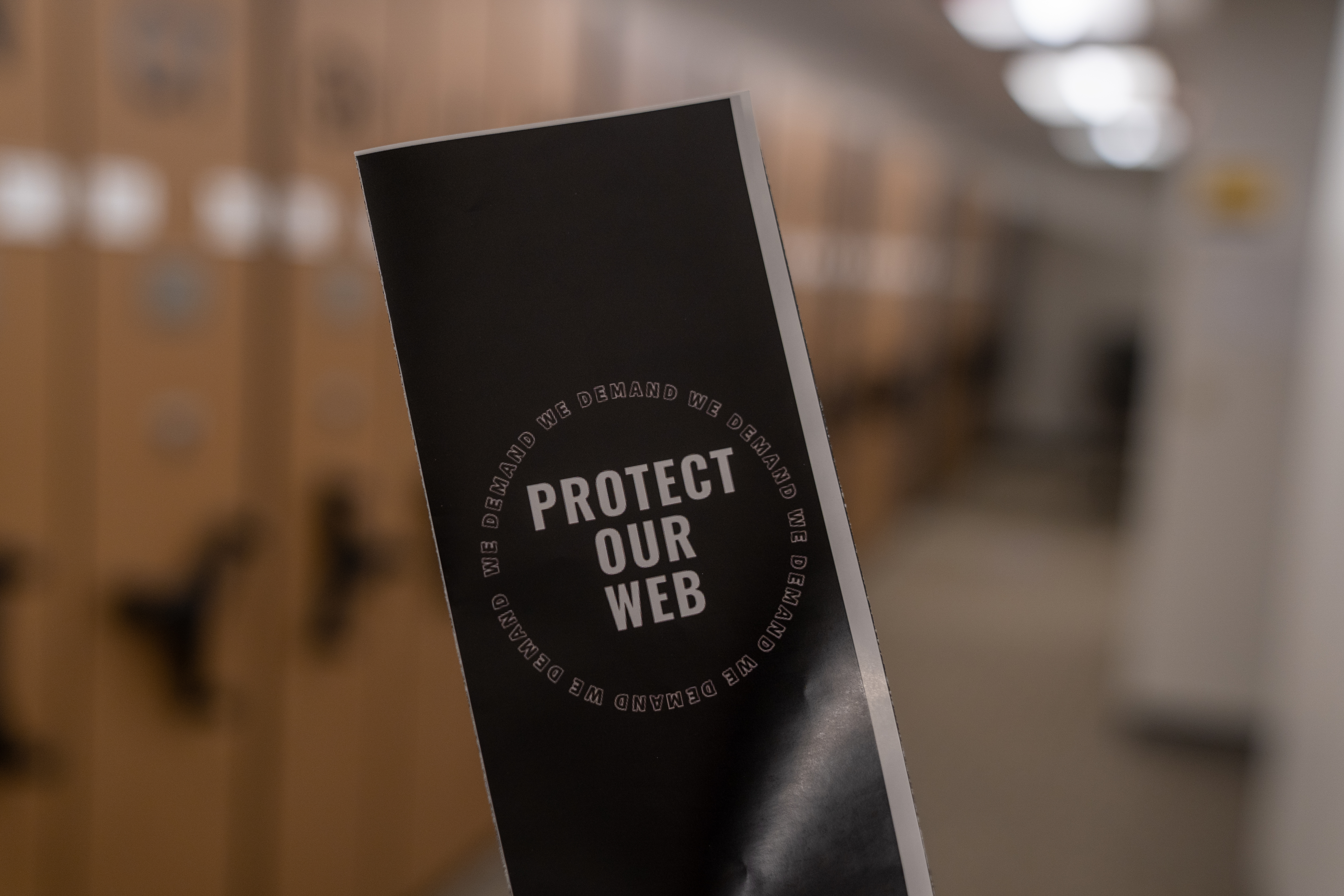You have /5 articles left.
Sign up for a free account or log in.

Douglas Southall-Freeman’s name was so contentious on the campus of the University of Richmond that someone spray painted over his name on the sign for Mitchell-Freeman Hall.
Ben Wasserstein
Tensions are mounting between Black students and University of Richmond administrators over a disagreement about two campus buildings named for people who espoused white supremacist ideology.
The students have demanded the names be removed. The university added the name of a late Black civil rights leader from Richmond to one of the buildings. The students see this move as an affront that honors the racist legacies of the buildings' namesakes. University leaders say the decision is a compromise that contextualizes the institution's past.
The university's Board of Trustees recently approved adding the name of the Black leader to the building and the names of enslaved people owned by one of the university's founders, for whom the other building is named, to a memorial on campus. Campus administrators said the move would provide more historical context about the university's history with slavery and white supremacy.
The buildings are named for former university president Reverend Robert Ryland, a church leader and slave owner who helped found the university, and Douglas Southall Freeman, a prominent alumnus and former university trustee who was also a eugenicist and segregationist. Freeman Hall is now named Mitchell-Freeman Hall, to include John Mitchell Jr., a Black trailblazer in Richmond media who challenged Freeman's racist beliefs. There are also plans to install a memorial on campus for the enslaved people who were owned by Ryland and forced to do manual labor in the early days of the institution, university president Ronald Crutcher said in a Feb. 25 statement.
“Removing Ryland’s and Freeman’s names would not compel us to do the hard, necessary, and uncomfortable work of grappling with the university’s ties to slavery and segregation,” Crutcher said. “It would not keep a spotlight on how historical university leaders also acted in ways to impede progress … It would instead lead to further cultural and institutional silence and, ultimately, forgetting.”
But where Crutcher, the university's first Black president, saw the changes as a positive and honest development and a public recognition of the university's painful and complicated history with racism, Black students at the university saw that history being honored and thrown in their faces.
“We as Black students are always cognizant of that history already,” said Shira Greer, a junior and leader in a coalition of Black students demanding the university change the names and implement other initiatives to support students of color. “To me, it seems like they’re using our history and our pain as a means to educate the entire campus.”
Students in the coalition and those who support it have threatened to “disaffiliate” with the university if their demands are not met by April; they say they will no longer participate in university committees, task forces or student organizations. They also would not donate money to the institution as alumni, Greer said. Seniors will disaffiliate on April 1 and other undergraduates on April 15 if the demands are not met, she said.
“We work too hard and contribute too much to this campus for our needs to be ignored in service of white supremacy,” said a statement distributed by the student coalition, which had been signed by about 680 students, alumni, faculty and staff members by Thursday.
Many other colleges and universities across the country have removed from campus buildings the names of men who supported slavery, segregation and white supremacy, or taken down statues and monuments of such men, as students, faculty members and alumni pushed for changes on campuses that once celebrated these figures without acknowledging or putting their historical records, ideologies or misdeeds into context. Calls to end these prominent displays have grown following the killing of George Floyd last year and the resurgence of the Black Lives Matter movement. Most campus leaders have granted those requests or initiated the changes unprompted.
Crutcher’s decision, which was in response to a 2019 request by student government leaders to remove Ryland's and Freeman’s names from the buildings, deviated from this trend. Rather than eliminate such figures from placards and building signs on campus, he sought to “braid memory into the fabric of daily life” and “create meaningful encounters with our past” by adding memorials to the enslaved people and Mitchell, who helped build and influence the university, he said in his statement.
Cynthia Price, associate vice president of media and public relations for the university, shared a written statement from Crutcher that said he empathizes with the "hurt and disappointment of community members" who are calling for the names to be removed.
"As a Black man and a descendant of enslaved men and women, I not only empathize with, but have experienced what they are feeling, having navigated many buildings named after men who would have viewed me as inferior because of my skin color," Crutcher said.
"Every campus with ties to enslavement and segregation must make decisions that fit their unique context and histories. The path we are forging aims to amplify the nuances and tensions of our history in ways our university has never done before, expanding upon the woefully incomplete narrative of our past," he said. "Because of it, we are now having difficult and necessary conversations about who we were, in the context of who we are becoming. And we are contending with the hard questions about how we got here and at what cost."
The students believe naming a building after a person is, at its core, a way to honor them. Greer said there are other ways to remember Ryland’s and Freeman’s complicated influence on the university while being considerate of the feelings of Black students.
Putting Mitchell's name next to the name of a eugenicist and segregationist also sends a message that the university equates the legacies of the two men, the student coalition’s statement said.
“We believe that the university’s plans as stated create a dangerous false equivalency,” the statement said. “This false equivalency suggests that all parties are worth honor and respect when that is simply not the case concerning Ryland and Freeman.”
Eric Grollman, a professor of sociology and a Black scholar-activist at the university (and a former Inside Higher Ed contributor), said the institution is at risk of severely damaging its relationship with Black students if it does not change the buildings' names. The decision overruled the wishes of students and suggests their views come second to the university maintaining the status quo, said Grollman.
“I’m concerned about the impact that it’s having on them,” Grollman said. “Is this a huge signal to Black students that they don’t matter?”
Grollman, who has taught at the university for eight years, said this is the first time in recent history and under Crutcher's leadership that a broad and organized activist movement by Black students has taken place on the predominantly white campus. Fifty-seven percent of about 3,200 undergraduates enrolled in fall 2019 were white, 9 percent were Hispanic or Latino, 7 percent were Asian and 7 percent were Black, according to the National Center for Education Statistics.
Black students have spoken up about racial issues on campus in the past, for example, in January 2020 when racial slurs were found written on the residence hall doors of students of color, Grollman said. Black students also requested a building on campus dedicated and designed for them to gather, which the student coalition said was promised in 2018. The coalition statement noted that administrators have “not released a plan to allocate space, funding, and other resources to create such a space as called for by the student body.”
Free Bangura, a historical strategist and founder and CEO of Untold RVA, a Richmond-based historical strategy firm "that lifts up the city's honored ancestors who fought for Black freedom," said she supports the Black students and other university members working to get the building names removed. But Bangura, who was involved in the university's Race and Racism project in 2017 and 2018, a now-concluded initiative to examine the university's history with racism, said she would encourage the university to go beyond the removal of names and "concentrate more on what can be built, rather than what can be torn down."
It's more about dismantling the systems that those men created and the ways in which they might still be operating at the university, she said.
"I think it’s important to re-examine the work of those men, rather than re-examining the name of the building, and re-examine the work of the people that they sought to undermine," Bangura said. "See how that plays into what continues to undermine and be amplified by the university today."
Grollman said the seriousness and “intensity” with which the student coalition is making demands is new. How Crutcher and other administrators decide to respond to the students will be a first-of-its-kind test of the university's support for students of color, Grollman said.
“The response has been one of cluelessness,” Grollman said. “We haven’t faced this intense activism from students before. Their courage is forcing us to either double down in our fearful silence or step up and stand with them.”
Kayla Corbin, a senior and coordinating committee member for the coalition, said Crutcher has promised to meet with the students this week and discuss their demands. Corbin is skeptical of the university’s previous statements about promoting “inclusivity” on campus given the decision to keep the original names of the buildings.
“It seemed antithetical to this goal of being inclusive,” she said. “Black students aren’t going to feel comfortable if the campus can’t make a decision as simple as changing a name of a building.”








